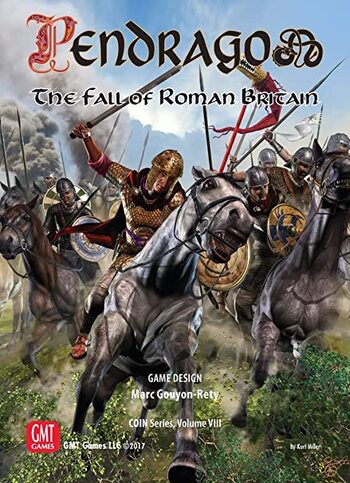 What is this game about? Pendragon: The Fall of Roman Britain is a COIN game set during the 4th and 5th centuries A.D., when the Romans still occupied Britain, but their power there was starting to wane. In the game, four factions each pursue different goals—the Dux, or Roman military, wants to maintain control over Britain, as well as increase Roman prestige in the area. The Civitates are their frenemies—Roman-British civilians who are also interested in stability and control, but who want to wrest power from the grabby Dux faction. Early in the game, the Dux can spend the Civitates' money, while the Civitates benefit from the support of Dux military forces. But both factions are careening towards fragmentation, when they split from each other and change the face of the game. Their common enemies are two factions of barbarian raiders—the Scotti from the west, who are looking for a tidy profit, and the Saxons from the east, who are initially only in it for the money but who develop an interest in a more permanent settlement post-fragmentation. Because Pendragon is a COIN game, the action always starts with an event card—one event card is active per round, and each faction in the game has a chance to act in the order printed on the card. But there's a catch: Only two factions get to take a turn per event card. Factions also cannot act two rounds in a row, which means that players will need to make important decisions about tempo. Everyone is able to see both the current event card and the upcoming one, and sometimes it is in a player's best interests to pass during one round, giving up a chance to take a turn because they want a crack at the event card that's currently on deck. Once a player decides to take a turn, there are even more interesting choices involved. If you choose to take the event printed on the card, then the second player for the round gets to take a full action. If you take a full action, the second player for the round might get to play the event card themselves. But if you take a limited action, you also limit what the second player for the round can do—by hobbling yourself, you also put a damper on your opponent. Your faction also has its own set of actions to take. You might want to move units, build, or fight, and all of these will cost you precious resources. The result of all this is a big, messy conflict that mirrors all the interesting parts of the decline of Rome's power in Britain. Every so often, an Epoch card will emerge from the event deck, which triggers a special round during which players check for victory conditions. If any faction is meeting its victory conditions during an Epoch round, then the player of that faction wins. Otherwise, play continues. If no clear winner emerges by the final Epoch round, then players tally points based on their individual faction goals to determine the winner. How does it play solo? Pendragon comes with a bot for each faction, so you can play one faction yourself and use bots for the other three. These bots are flowcharts that ask you to check the board state and then make the most logical choice for the faction that is taking a turn. In Pendragon, I think it's best to start by controlling both the Dux and Civitates factions before fragmentation, then take over whichever faction is weakest after fragmentation (this encourages you to give equal love and attention to each faction during the early part of the game). The Scotti and Saxons have simpler bots to run, which will make your first solo games go more smoothly. 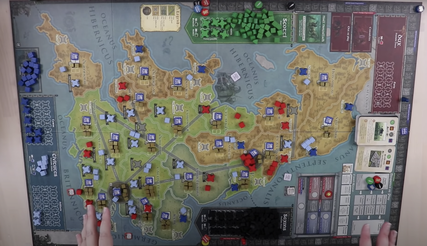 The board is so big I usually leave it sideways. The board is so big I usually leave it sideways. Overall Thoughts As a simulation of Roman history, Pendragon is fantastic. From the fascinating designer notes and bibliography to the actual gameplay, where tensions between factions play out in ways that mirror historical events, this game is steeped in its setting. It's obvious that Morgane Gouyon-Rety knows her stuff. And when you play her game, you'll come out knowing a bit more, too. As a game, Pendragon is full of delightful choices. How closely should the Dux and Civitates work together, knowing full well that a split is on the horizon? When is the right moment for invading barbarians to try to settle down in the land they've pillaged? When is the event on a card really worth taking, as opposed to taking a normal action? And is it safe to go for it and take a big turn, knowing full well that another faction might take advantage and do something irritating to hurt you? Resources are precious, which means that every decision, from splurging to pay for road maintenance to engaging in battle, can have serious consequences. This game does not reward careless decision making, and even the best laid plans can be torn apart by some bad die rolls during conflict. Pendragon also represents an interesting development of the COIN system. COIN (COunterINsurgency) games typically focus on specific conflicts between powerful governments and insurgents within a limited period of time. Pendragon covers centuries, and to fit its theme, it dispenses with common elements in other COIN games, such as guerilla fighters. I liked most of the tweaks made to the system, and I think the design decisions were well made for Pendragon's setting. That said, Pendragon is a heavy game within an already-heavy system. It is the most complex COIN game I have played, and while every aspect of the game makes sense and is explained in the rulebook, there is a lot going on, especially when moving through all the stages of a battle. It is not a casual game for a lazy afternoon--Pendragon is a rewarding but very consuming experience, even if you choose to play only a short game. (There are several scenarios of varying lengths.) I adore playing this game, but I also know that it won't make it to my table as often as I would like. I also think that it is easier to play some factions than others. When soloing as the Scotti, it seems easier to roll over the Dux and Civitates than it does to play as the Romans who are trying to squash those pesky barbarians. I intend to keep testing this theory over time. Do I recommend it? If you want a deep game that is both excellent to play and excellent as a historical simulation, then Pendragon is a great choice. But be ready to invest a lot of time and effort into learning it, particularly if you do not have experience with COIN games. (I personally would recommend starting with a different game in the series, but perhaps you wish to live dangerously.) Overall Rating: 4 stars Rating Scale: 5 stars - I love it! 4 stars - I really like it. 3 stars - I like it. 2 stars - It's okay. 1 star - Meh.
2 Comments
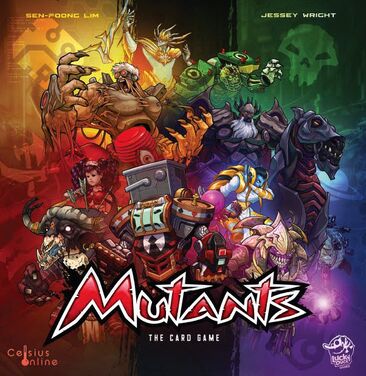 Full disclosure: Lucky Duck Games provided me with a review copy of Mutants. What is this game about? Mutants is a tactical card-battling game in which each player has a team of mutants ready to fight it out in the arena. The main point of the game is to score the most victory points before the end of five rounds. This feat is primarily achieved by performing well on the dominance track. In Mutants, there is a constant battle for "king of the hill," as players gain power and try to force their enemies to lose it. If one player can get into the "fury" space on the dominance track, while forcing opponents into the "dread" space, then they have a chance at more victory points every single turn. As players cycle through their decks, they also thin those decks by "freezing" mutants. Frozen mutants are removed from play, but they are also worth victory points at the end of the game. All players start with the same set of basic mutants, but can access more powerful mutants based on either a draft or on deck construction that takes place before the actual battle. On each turn, players have a choice between three actions. They can deploy a mutant, which means putting it into their active mutant space and using its activation power. They can breed a mutant, which means discarding two cards with genes that match an advanced mutant, and then bringing that more powerful card immediately into play. Or they can discard only one card to "incubate" an advanced mutant, which allows them to put it on top of their deck next round (but they have a no-action turn during the current one). There are also some fun spatial elements to gameplay that take place on the player board. Mutants start out in the "active mutant" slot, but players must slide the previous active mutant to the left or to the right each turn. Mutants are eventually slid off of the player board altogether, which can activate further special powers. Most mutants have a power that is triggered when they become active mutant, and if they can leave the board without being knocked down, they have a second power that is triggered when they leave the board. How does it play solo? Mutants comes with several solo bosses who have their own decks and special powers. The base game includes two solo bosses, with three more available across the expansions. While in the multiplayer game everyone is vying for victory points, in solo, you use the same mechanisms to reduce the boss's life total instead. When the boss is kicking your butt on the dominance track, you aren't punished, but they can gain life back and undo all of your hard work. If you can get the boss down to zero life in five rounds, you win! 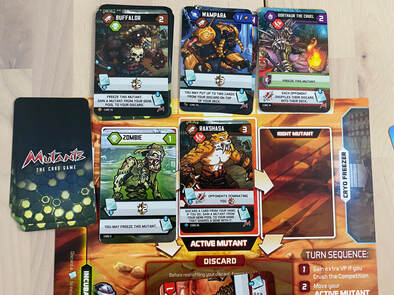 The board with mutant slots and advanced mutants to choose from. The board with mutant slots and advanced mutants to choose from. Overall Thoughts Mutants was a very pleasant surprise for me. I hadn't even heard of the game until Razoupaf told me about it, and wasn't sure what to expect. What I got was a quick, snappy card battle with some very light deck construction. I particularly like the way the dominance track creates a constant struggle, with both you and the solo boss scrambling to get to the top and push each other down. Depending on what cards come out, you can go from top of the world to rock bottom, then have to find a way to scramble back up again. I also like that Mutants is fast but still full of decisions. What advanced mutants should be the core of the deck I construct? Can I afford to incubate, which will give me a better card later, but do nothing to hurt the boss this turn? What tactical plays can I make with my cards to keep the boss from slipping ahead of me on the dominance track? Which card should I freeze—a weaker one that is worth fewer points, or a more powerful one that will knock a few extra points off of the boss's life total? Even deciding whether to slide a card to the left or to the right can be an important choice, based on what cards are in play and which areas on your player board might be attacked. For all of these choices, Mutants is still a light card game. The cards you have access to during any given game are limited, and the powers are fun but not overwhelming. In some ways this is a little disappointing, because you aren't going to manage deep deck construction or deck building the way you might with a chunkier game. But if you want a fun skirmish that doesn't take all night, then Mutants may be a good choice. I will say that I'm not convinced that Mutants is a great pick for solo-only play. The two bosses in the base box are not enough, and one of them, Jack Ice, is so difficult to beat with cards from the base box that I haven't figured out how to do it yet. (If you have, let me know in the comments what advanced mutants you were using!) To get the fullest possible solo experience, you'll need to purchase both of the expansions in addition to the base game, for a total of five bosses. At list price, that will come out to about $90 total—a steep price for a solo game that is very fun, but not one for the ages. If you are planning to play Mutants both alone and with friends, though, I think you'll get your money's worth. Do I recommend it? Yes, if you plan to play both alone and with others. Mutants is mechanically excellent, but I'm not convinced it's a great value for solo. Overall Rating: 3.5 stars 5 stars — I love it! 4 stars — I really like it. 3 stars — I like it. 2 stars — It's okay. 1 star — Meh. 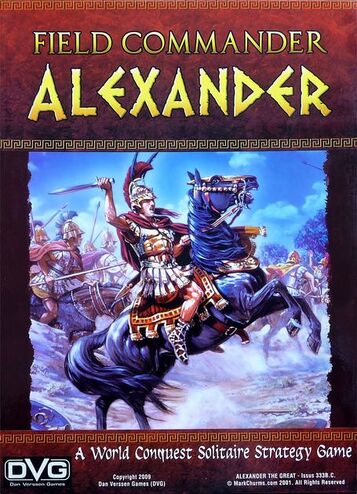 Full Disclosure: I received a review copy of Field Commander: Alexander from Dan Verssen Games What is this game about? Field Commander: Alexander is an entry-level war game in which you take on the role of Alexander the Great during some of his most famous battles. The game comes with four boards, one for Granicus, one for Issus, one for the Siege of Tyre, and one for Gaugamela. You can either choose one of these scenarios and play it, or you can link them all together as one big campaign in which you try to establish Alexander's prominent place in history. As you move Alexander's army, you'll have a lot of choices to make. Resources are incredibly tight, and you'll find that you never have enough gold—yet you are always tempted to spend more of it. A large army makes it easier to win battles, but can also make it more expensive to move. A small army makes it easier to take damage when making a scouting roll, and will of course make battles a bit more harrowing. Each time you conquer a pivotal area, you will choose whether to raze it for a large amount of gold now, or govern it for a smaller amount of gold during each remaining turn. And you can also spend your gold and glory to build temples, build cities, gain insights (special powers during the game), acquire advisors, and gain access to more and better battle plans. While in some situations you will have to battle opposing armies, there are also times when you have a choice between fighting and intimidation. You'll also have to choose whether to accept and fulfill prophecies. Prophecies can have annoying conditions when you just want to get on with it and win a campaign—but they are also the key to leveling Alexander up over the course of a game. He is fairly weak and can die easily early on, but over the course of his life, he becomes extremely powerful. This is particularly important in battle, because if Alexander can defeat the enemy leader, he ends the entire fight immediately. However, once he chooses to attack an enemy leader, they are locked in combat until the battle is over, which is a high-risk situation early on when Alexander isn't powered up yet. Your biggest choice may simply be when to end your turn. While your enemies only get one chance to carry out orders each round, you can complete your conquest turn as many times as you wish—it's up to you when to stop. If you push hard, you have a better chance to end with a higher score because you are rewarded for finishing faster. But the harder you push, the more beat up your army might get, and the less gold you'll have to keep funding your continued movements. At the end of the game, you'll determine how many victory points you've earned based on how long it took you to complete the scenario, and on how many cities you built. If you're playing a larger campaign, you're playing for immortality points, so you'll also want to make choices that benefit Alexander in the long run. How does it play solo? Field Commander: Alexander is a solitaire-only game. Yay! 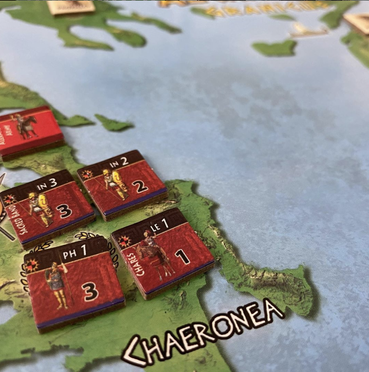 Overall Thoughts Field Commander: Alexander is a very enjoyable game, and one that is highly accessible to new wargamers. If you're looking to move chits around a map and have them get into a few fights, but you've never done it before, then I think this game is a great choice. Setup instructions for each scenario, as well as turn order and any other specific information you might need, is printed directly on the game board. Although there are many choices to make in Field Commander: Alexander, they mostly boil down to how much money you have. The game is very economically tight, and trying to make decisions for the long run when you have immediate needs gives the game a lot of interest, particularly when you are playing the long campaign, which rewards you more for your long term investments. Deciding how far to spend down and how hard to push yourself is the heart of the game, and it provides a lot of tension and drama. The bells and whistles are fun, too—selecting advisors and battle plans is great fun, and also makes battles something more than just die rolling. A well chosen and correctly executed battle plan can be tremendously satisfying. However, Field Commander: Alexander has its limits. For all of the fun choices it offers, the game is very linear. You'll do roughly the same things in the same order every time, which can make you feel like you've "solved" the game after you've played it enough. Although enemy orders and operations can be a pain, the enemies remain relatively static. The pressure to move quickly in the quest for maximum victory points also takes a little of the fun out of the game, because you don't pause and fully enjoy all of the game's options. Outside of the campaign, your highest scores are likely to be the ones you hit when you were pushing your army hard and getting lucky, not fretting over all of the smaller choices like building or picking up extra advisors or fulfilling prophecies. Things are a bit better when you are campaigning and going for "Immortality Points" instead of VP, but even then you will end up puzzling out the best course of action over time. Do I recommend it? If you are a new wargamer or very interested in Alexander the Great, then yes, you will have a good time with Field Commander: Alexander. I have enjoyed my time with it, but don't feel that it is a permanent "keeper" in my collection. Overall Rating: 3.5 stars Rating Scale: 5 stars — I love it! 4 stars — I really like it. 3 stars — I like it. 2 stars — It's okay. 1 star — Meh. |
AuthorMy name is Liz Davidson, and I play solo board games. A lot of solo board games... Archives
August 2021
Categories
All
|
 RSS Feed
RSS Feed